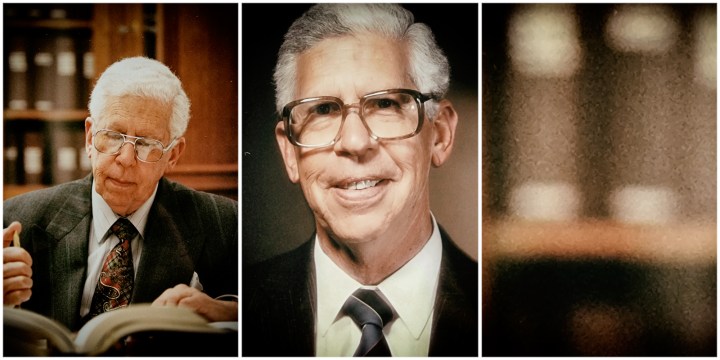TRIBUTE
Gerald Friedman, Western Cape’s truly great Judge President

Gerald Friedman died last week, shortly before his 95 birthday. Many readers may not have known of Judge Friedman in that he retired as Judge President of the Western Cape High Court in 1998. However, he deserves to be known widely because he was a fine judge and a truly great Judge President.
As someone privileged to have served under Western Cape Judge President Gerald Friedman’s leadership, albeit for too short a time, I can testify to his superb mentorship and thoughtful and extremely efficient judicial leadership. He was a possessor of a clear vision during the 1990s of the imperative of the transformation of the Bench to ensure demographic representivity of a judiciary which would be capable of meeting the profound legal challenges that awaited it in the newly minted democracy.
Graduating from UCT in 1949, Friedman was called to the Bar, where he built a successful practice, particularly in commercial and administrative law. In 1977, he was appointed a judge of the then Cape Province Supreme Court, where he served until 1990, when he was elevated to the Appellate Division.
To the great fortune of the Cape Supreme Court, he returned there in 1992 to become Judge President where the approach he adopted to the leadership of an important institution was in marked contrast to the apartheid apparatchik who had been the previous Judge President for a long time, one George Munnik.
By then, Friedman’s judicial quality was luminously illustrated in the pages of the South African Law Reports. Arguably the finest example was his dissent in Omar v Minister of Law and Order (1986(3) SA 306 (C)). South Africa was in what seemed at the time to be the interminable darkness of PW Botha’s regime and continuous states of emergency.
Regulations issued under the Public Safety Act had sanctioned detention without trial, denial of access by detainees to a lawyer and no provision of any reasons for the detention or a right to be heard. In a South African equivalent of Lord Atkin’s famous dissent in Liversidge v Anderson, Judge Friedman adopted the approach that, unless expressly ousted, a detainee’s rights remained intact.
Needless to say, he was in the minority of one. Not only did his colleagues Munnik and Werner Vivier adopt a pro-executive approach but a Full Bench of the Transvaal Provincial Division lamentably failed to follow Friedman, as did the Appellate Division; indeed going so far as to indirectly proclaim martial law.
Friedman’s minority represented the conduct of the model judge, Ronald Dworkin’s Hercules: writing with clarity and forensic accuracy to promote law’s integrity while showing the courage to preserve the rule of law where all his colleagues headed for the authoritarian hills.
In far less contentious terrain, Friedman also showed, in Solaglass Finance Company v CIR, 1990, great insight into the intricacies of tax law where he penned a minority judgment concerning the deductibility for income tax purposes of certain claimed losses. His judgment reveals a masterful exposition of tax law of a kind not seen these days. It represents an unostentatious, carefully well-reasoned judgment with the employment of comparative law only when necessary which should serve as a model of appellate judicial writing.
But it was as the Judge President that Friedman truly was a model for judicial leadership. There can surely not have been a better Judge President. He built a collegial Bench, never shying away from hearing cases, whether it be a complex matter or being a judge in the unopposed court. He had a fine idea of every case allocated to his judges and he was generous in the extreme to young inexperienced judges. I can personally testify to his generosity in helping me by way of his vast experience of the law, thereby transferring knowledge to the next generation.
I can do no better in tribute than to express the hope that the Judicial Service Commission examines the record of Judge President Friedman when it compiles and applies criteria for the appointment of Judges President. All too often we forget it is the quieter people in our community who achieve far more than the self-promoters ever do. Judge Friedman deserves to be remembered for the depth of his contribution to the law. DM
Dennis Davis is a retired Judge President of the Competition Appeal Court.


















Thank you.
He reversed a custody order and gave me custody as a single parent. I will always be grateful to Judge Friedman. May he rest in peace.
It was an honor and pleasure to have had Gerald in my life for as long as I did.